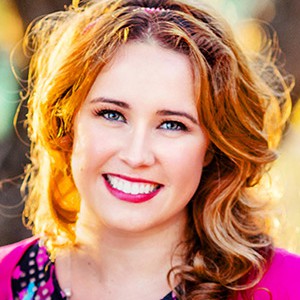
Leah Sheffield
In 2013, Leah Sheffield was in business-to-business sales, selling textiles, and first aid and safety products to manufacturing companies.
“It was not a very glamorous job and not a very rewarding career path overall,” said Sheffield.
Fast forward to less than 10 months later and she was on her way to the job of her dreams as a program manager at a national-brand destination management company. How did it happen? She went through the Meeting and Event Planning Professional Certificate program at SDSU’s College of Extended Studies.
How did you find out about the Meeting and Event Planning program and what was your goal in taking it?
My fiancé knew how much I wanted to make a change in my career to events, so he took it upon himself to Google “event courses in San Diego,” and it came up with SDSU’s professional certificate program. I came into the program hoping to gain insider knowledge of the industry, and maybe a few job leads by the end. I left each class feeling confident and excited about my choice to change my career path.
What gems of wisdom did you come away with from courses such as Food and Beverage Planning, Site Selection and Contract Negotiation, and Event Marketing and Promotion?
That the job is about being “pleasantly persistent” whether we’re working with vendors or clients. Also that it’s really a trial-by-fire industry. You won’t learn your craft until you get into it and are hands-on. And finally, knowing that this industry is a tiny one and everyone knows everyone, so don’t burn bridges where you can help it! That also works to your benefit when looking for industry contacts, so be friendly and relatable to anyone you meet. Always count on making a great first impression.
How important was it that the instructors actually work as meeting and event planners in San Diego?
They know the local industry inside-out, and that helped me/us to understand that San Diego is one of the largest hubs in the world for both the private and corporate event sectors.
What are some of the nuances you learned about the industry?
That it’s ever-changing and adapting to the new technology standards that come out every few months, so the best way to stay ahead of the trends and stay connected is with industry groups like MPI [Meeting Professionals International] and ISES [International Special Events Society]. Plus we get a great student rate.
Can you speak to the program’s networking opportunities?
I made it a point to grab lunch or a drink with three of my instructors who I made a connection with during our classroom time. One of these three got me my first industry job with a third-party meeting planning company over a year ago, and she and I have become great friends ever since! You are your own worst enemy if you don’t put yourself out there to meet and greet with other people in your same position, if not other industry professionals.
How long did it take to complete the program?
It took me a full year to complete the program.
What are your primary duties in your current job?
I’m a program manager for a national DMC [destination management company]. I facilitate all the operations logistics for our corporate clients when they come into San Diego. We help facilitate the “social side” of events with complete execution of transportation, tours, off-site activities and dinners, decor, entertainment, etc.
In your current job, did a situation ever arise where you were able to avoid a problem by directly implementing something you learned in the Meeting and Event Planning program?
There have been so many, but most of all, our instructors repeated several times about setting the right expectations for your role — whether it’s during the hiring process with an industry company, or when negotiating specifics with your client or vendor. Set yourself up to succeed, and while you should always be optimistic about your own abilities, don’t sugarcoat or outright lie about your industry knowledge or ability. Otherwise it will become very apparent from the moment you start an event or job.
What do you think are the top-five skills a meeting and event planner needs?
The ability to adapt, be level-headed, be candid, have a sense of humor (don’t take yourself or your work too seriously), and be optimistic overall.
Would you recommend the Meeting and Event Planning program to others?
I would and I have recommended it to at least 10 people in my professional network.
Any words of advise for someone considering a career as an event planner?
I would suggest that anyone who wants to get into this industry should not be afraid to make mistakes and ask questions. It’s also really important to find an industry mentor; someone who is in a role you would like to fill, or has job you admire in the industry. Shelby Greene (one of our instructors) is someone who has become my friend but was first my industry mentor. She has been an invaluable asset to me as an industry resource and colleague. She is someone whose ideas and opinions I value over most anyone else’s in the industry with her 20-plus years of experience.


